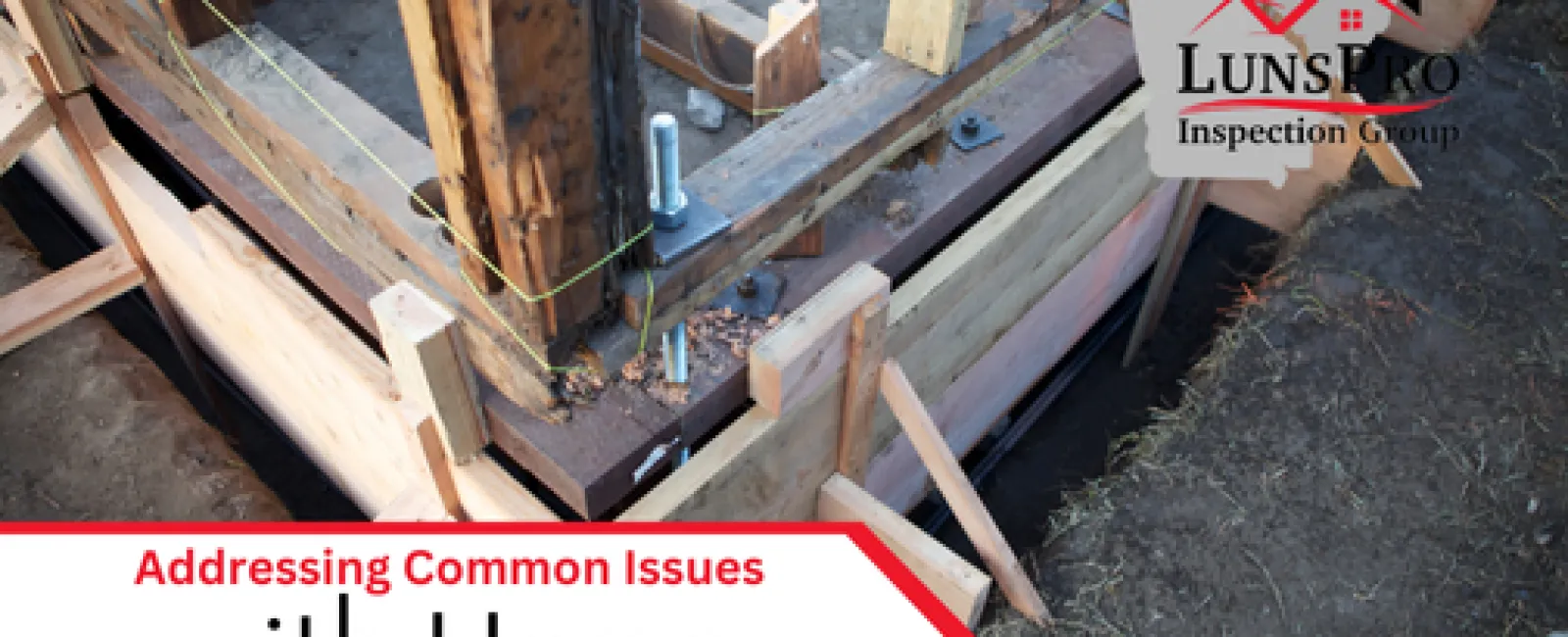A strong foundation is essential for any home, serving as the bedrock upon which the entire structure stands. However, over time, many homes experience foundational issues that, if left unaddressed, can lead to significant structural damage. From cracks in the walls to uneven floors, foundation problems can manifest in various ways, affecting the integrity of the home as well as its value. These issues are particularly prevalent in regions with fluctuating weather conditions, like Georgia, where soil movement and moisture levels can wreak havoc on a foundation.
When it comes to identifying and addressing foundation issues, LunsPro Inspection Group is a trusted resource for homeowners. With services ranging from Atlanta residential and commercial home inspections to Atlanta drone inspections, the expert team, including Atlanta, GA home inspectors, can help ensure that your home's foundation remains in good condition.
In this article, we will discuss common foundation problems, their causes, how to identify them, and the role of professional home inspections in keeping your home safe and sound.
Common Foundation Issues in Homes
Foundation problems can vary in severity, but any issue with a home's foundation should be taken seriously. Below are some of the most common foundation issues homeowners face:
Cracks in the Foundation: Cracks are one of the most obvious signs of foundation trouble. They can appear in different sizes and locations, such as on the walls, floors, or even the foundation itself. Small hairline cracks might seem insignificant, but larger, more noticeable cracks could indicate significant foundation movement or shifting.
Settling or Sinking: Over time, some homes may begin to sink or settle unevenly, leading to sloping floors and structural imbalances. This can be caused by poor soil conditions, water drainage problems, or a weak foundation.
Bowing or Buckling Walls: In extreme cases, the foundation can shift to the point where the walls inside the home begin to bow or buckle. This can be a sign of excessive soil pressure against the exterior foundation walls, and if left unaddressed, it can lead to catastrophic structural damage.
Foundation Upheaval: While settling involves the foundation sinking, upheaval is the opposite: the foundation rises due to expanding soil, often caused by moisture. This issue can be particularly problematic for homes in regions with heavy rainfall, like certain parts of Georgia.
Causes of Foundation Problems
Understanding the causes of foundation problems is key to preventing and addressing them. Some of the most common causes include:
Soil Movement: The type of soil under your home can have a significant impact on the foundation. Expansive soils, which absorb a lot of water, can swell and shrink depending on moisture levels, leading to foundation movement.
Water Damage: Poor drainage around the foundation can cause water to seep into the soil, increasing the risk of soil erosion, swelling, or even foundation cracks. Atlanta septic and sewer scope inspections can help identify water-related foundation risks.
Tree Roots: Large trees planted too close to the home can cause foundation problems. Tree roots can grow beneath the foundation, disturbing the soil and causing cracks or shifts in the structure.
Construction Quality: Homes built with poor-quality materials or subpar construction practices may be more prone to foundational issues. This is why a thorough inspection is essential when purchasing a home or building a new one.
Identifying Foundation Problems Early
Early identification of foundation problems is crucial to preventing further damage. Below are some signs that could indicate foundation trouble:
Cracked Walls and Ceilings: Vertical, horizontal, or stair-step cracks in walls or ceilings may point to foundation settlement.
Sticking Doors and Windows: If doors and windows begin to stick or have trouble opening and closing, this could be due to foundation movement that has warped the frames.
Uneven or Sloping Floors: Floors that sag, slope, or bounce can be a sign of foundational shifts. This issue can become more pronounced over time.
Gaps Around Exterior Doors and Windows: Visible gaps between the wall and doors or windows are a common sign of a foundation that is shifting.
An Atlanta home inspector from LunsPro Inspection Group can conduct a thorough examination of your property to identify any foundation issues. Regular Atlanta home inspections, especially for older homes or those located in areas prone to soil movement or heavy rainfall, are essential for early detection.
The Importance of Professional Home Inspections
Home inspections are a crucial step in identifying and addressing foundation problems. LunsPro Inspection Group offers a range of inspection services designed to assess the overall health of your home, including its foundation. With an Atlanta, Georgia home inspector on site, homeowners can gain peace of mind knowing that their home's foundation is thoroughly evaluated.
Atlanta drone inspections allow for a more comprehensive view of the home's exterior and roofline, areas that can be affected by foundation shifts. This technology can identify cracks or shifts that may not be visible from ground level.
Atlanta septic and sewer scope inspections are particularly important for detecting foundation issues caused by water damage or drainage problems. Foundation cracks or settling can often be linked to water leaks or poor drainage around the home.
Atlanta mold and air quality testing can detect the presence of mold or excessive moisture in the home, which are both common indicators of foundation issues. Poor insulation or ventilation can exacerbate moisture problems, leading to more severe structural damage over time.
Solutions for Common Foundation Problems
Fortunately, many foundation problems can be repaired if caught early. Below are some common solutions:
Crack Repair: Minor foundation cracks can be sealed using epoxy injections or polyurethane foam to prevent further damage.
Piering or Underpinning: For homes with significant settling or sinking, piering involves driving steel piers into the ground to stabilize the foundation and prevent further movement.
Slab Jacking: This technique is used to lift a sinking foundation back into place by injecting a cement-like material beneath the foundation to raise it.
Drainage Solutions: Improving drainage around the home can prevent water from pooling near the foundation. Installing French drains or regrading the landscape can help keep water away.
LunsPro Inspection Group can help you determine the best course of action based on the severity of your foundation issues. Whether you need minor repairs or more extensive stabilization work, our team of Atlanta home inspectors can provide guidance.
Foundation problems are among the most serious issues homeowners can face, but early detection and intervention can save thousands of dollars in repairs. With regular Atlanta residential and commercial home inspections, homeowners can ensure their foundations remain strong and stable.
LunsPro Inspection Group provides a variety of services, from Atlanta drone inspections to Atlanta septic and sewer scope inspections, ensuring that every aspect of your home is thoroughly assessed. Whether you're dealing with water damage, soil movement, or simply want peace of mind, an Atlanta, GA home inspector can help you address any foundation concerns before they escalate.
By investing in professional inspections and addressing foundation issues early, you can protect your home's value, integrity, and safety for years to come.

